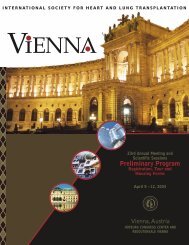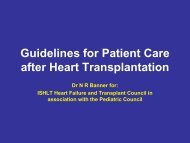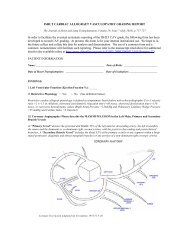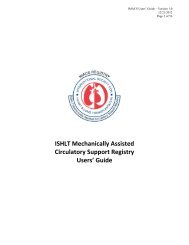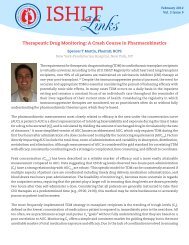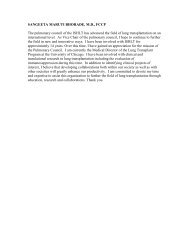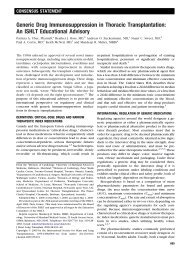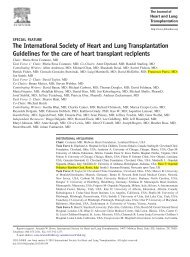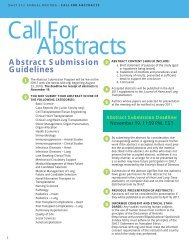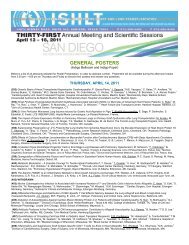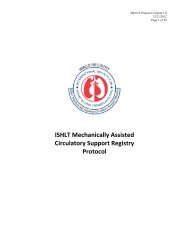Task Force 4: Inpatient Management of Patients with MCSD - The ...
Task Force 4: Inpatient Management of Patients with MCSD - The ...
Task Force 4: Inpatient Management of Patients with MCSD - The ...
Create successful ePaper yourself
Turn your PDF publications into a flip-book with our unique Google optimized e-Paper software.
3. Pre-albumin and C-reactive protein can be monitored weekly to track the nutritional<br />
status <strong>of</strong> the post-operative patient. As nutrition improves, pre-albumin should rise<br />
and C-reactive protein should decrease.<br />
Level <strong>of</strong> Evidence: C.<br />
Device Related Education<br />
Health Care Provider Education. MCS education is an essential component <strong>of</strong> a<br />
MCS program. To safely manage MCS patients, a broad range <strong>of</strong> in-hospital health care<br />
pr<strong>of</strong>essionals need to be educated including physicians, nurses, and other multidisciplinary<br />
team members (e.g., physical therapy and occupational therapy). A plan for<br />
comprehensive training <strong>of</strong> the majority <strong>of</strong> nurses in the hospital areas involved in the<br />
care <strong>of</strong> MCS patients will ensure that there are enough competent nurses to care for<br />
these patients.<br />
Orientation to MCS should incorporate both theory and practical sessions <strong>with</strong><br />
the use <strong>of</strong> a training simulator, allowing the staff to have hands on experience <strong>with</strong> the<br />
equipment. Education regarding acute management should address the indications for<br />
MCS implantation, components <strong>of</strong> the device(s), post-operative hemodynamics and<br />
daily management (including driveline exit site dressing changes), recognition and<br />
management <strong>of</strong> <strong>MCSD</strong> alarms, emergency responses, medications, and MCS adverse<br />
events. 41 Providing literature on new devices will help to prepare nurses to care for<br />
patients <strong>with</strong> these devices. 42 After orientation to MCS, many institutions provide<br />
refresher courses and require semi-annual or annual assessment <strong>of</strong> MCS<br />
competencies. Regular competency assessment may help to maintain the nurse’s<br />
confidence and knowledge in the care <strong>of</strong> MCS patients. 41-43 Learning styles <strong>of</strong> staff<br />
members need to be considered in the education program. 44 Ensuring nursing<br />
accessibility to guidelines and protocols promotes consistent and safe management<br />
when caring for MCS patients. A device checklist or flow sheet, based on guidelines for<br />
monitoring MCS and providing care, facilitates guideline adherence.<br />
Patient Education. A collaborative multi-disciplinary approach to education <strong>of</strong> the<br />
patient, family, and friends is essential to the safe discharge <strong>of</strong> a MCS patient. An<br />
explanation <strong>of</strong> the surgical implant, post operative course (including recovery,<br />
13





